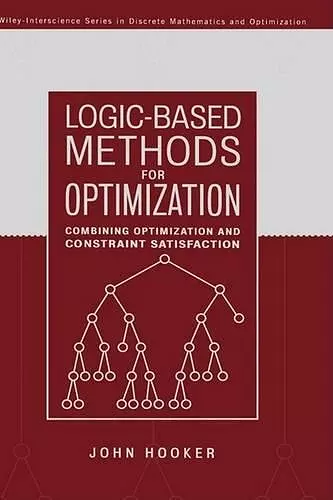Logic-Based Methods for Optimization
Combining Optimization and Constraint Satisfaction
Format:Hardback
Publisher:John Wiley & Sons Inc
Currently unavailable, and unfortunately no date known when it will be back

A pioneering look at the fundamental role of logic in optimization and constraint satisfaction
While recent efforts to combine optimization and constraint satisfaction have received considerable attention, little has been said about using logic in optimization as the key to unifying the two fields. Logic-Based Methods for Optimization develops for the first time a comprehensive conceptual framework for integrating optimization and constraint satisfaction, then goes a step further and shows how extending logical inference to optimization allows for more powerful as well as flexible modeling and solution techniques. Designed to be easily accessible to industry professionals and academics in both operations research and artificial intelligence, the book provides a wealth of examples as well as elegant techniques and modeling frameworks ready for implementation. Timely, original, and thought-provoking, Logic-Based Methods for Optimization:
* Demonstrates the advantages of combining the techniques in problem solving
* Offers tutorials in constraint satisfaction/constraint programming and logical inference
* Clearly explains such concepts as relaxation, cutting planes, nonserial dynamic programming, and Bender's decomposition
* Reviews the necessary technologies for software developers seeking to combine the two techniques
* Features extensive references to important computational studies
* And much more
"This is a book that should be widely read by graduate students and researchers in both the computer science and optimization communities." (Choice, Vol. 38, No. 7, March 2001)
"Goal is to broaden the conceptual foundations of optimization to include logical and constraint based approaches to traditional optimization methods." (American Mathematical Monthly, November 2001)
"The author combines a low-key, often conversational presentation with enthusiasm for a synthesis with traditional optimization methods..." (SIAM Review, Vol. 43, No. 4)
"The book is for practitioners as well as theorists" (Zentralblatt Math, Vol.974, No.24, 2001)
ISBN: 9780471385219
Dimensions: 244mm x 162mm x 29mm
Weight: 900g
520 pages